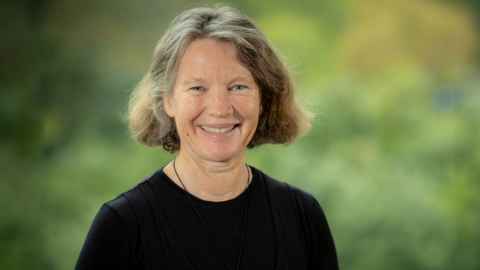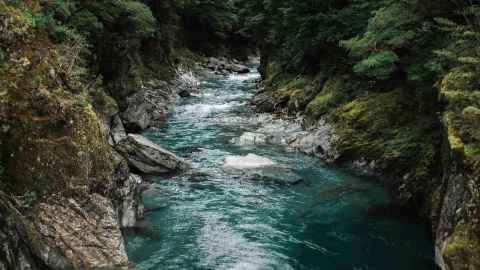Can technology solve our environmental crisis?
10 October 2025
The Blue and Green Technology Conference aims to bring brilliant minds together to examine how new tools can tackle environmental problems.

The Blue and Green Technology Conference will be held at Waipapa Taumata Rau, University of Auckland on 2 and 3 December.
Organised by Ngā Ara Whetū, Centre for Climate, Biodiversity and Society, the conference aims to bring brilliant minds together to examine how new tools can tackle environmental problems.
Ngā Ara Whetū co-director Professor Jacqueline Beggs says many governments around the world are failing to protect the natural environment or cut greenhouse gas emissions, so researchers and businesses need to pitch in to help solve these environmental problems.
“Extractive and polluting practices are exacerbating climate change and biodiversity loss - and costing lives.
“We need innovative ideas to deliver the solutions we desperately need for the planet,” says Beggs.
European Union ambassador to New Zealand Lawrence Meredith will open the event, which aims to strengthen ties between Aotearoa and Europe.
“The conference aims to create a platform where people can share big, bold ideas, their successes, what didn’t work and what was learned from that.
“It will feature stellar researchers from around the country presenting cutting edge research, industry panels, and discussions about government policies that could promote sustainable innovation,” says Beggs.
A highlight will be the Cleantech Expo, which offers an opportunity to meet innovators driving sustainable change, with free entry for the public on 2 December from 2pm to 4pm.
Ideas for clean-tech start-ups can be shared at the event, which will be attended by industry representatives.

Keynote speakers include:
- Lucy Chatburn, a principal consultant at Cleantech Group in the United Kingdom, where she leads the innovation ecosystem advisory practice.
- University of Canterbury Professor Aaron Marshall, who is chief science officer at Ternary Kinetics, a deep-tech startup developing a new class of liquid-phase hydrogen carriers for heavy transport. He is also the co-founder of Zincovery, which is commercialising low-emission zinc recycling.
- Dr Sean Simpson, a New Zealand technology entrepreneur and biochemical engineer. Simpson co-founded LanzaTech, which has developed a gas-fermentation platform that converts industrial waste gases into fuels, chemicals, and materials. In 2020, the company created LanzaJet to focus on sustainable aviation fuel and diesel production. He is a key part of the Ternary Kinetics leadership team.
- Angus Blair, a partner at Outset Ventures, a New Zealand deep technology fund and incubator.
- University of Auckland Associate Professor in Māori Studies Dan Hikuroa, who is UNESCO New Zealand Commissioner for Culture and an expert on weaving indigenous knowledge and science.
- E-Lyn Tan, a principal analyst in New Zealand Treasury’s Green Bond Team.
- Dr Florian Graichen, general manager of biomanufacturing and biotechnology at New Zealand’s Bioeconomy Science Institute, which is driving the transition to a climate-resilient bioeconomy.
- University of Auckland Professor of Computer Science Gillian Dobbie, who has extensive experience in technology for environmental science, horticulture and health.
- Holly Beals, a programme director of Creative HQ’s Aurora Climate Lab, which offers a 12-week programme to help climate tech startups strengthen their purpose and commercial potential.
- Director of FOMA Innovation at the Cawthron Institute Heni Unwin, whose research focuses on aquaculture technologies, ecotoxicology and climate change.
- Jessica Venning-Bryan, co-founder of Factor, a climate-tech company building digital infrastructure for the new energy economy.
- University of Auckland Senior Lecturer in Engineering Science Dr John O’Sullivan, who is co-director of the Geothermal Institute.

- University of Auckland Professor JR Rowland, who is Pro Vice-Chancellor of Global & Graduate Research. She is a structural geologist whose research focuses on tectonic-magmatic-hydrologic interactions, particularly in rift settings.
- John Worth, managing director and CEO of sustainable mineral recovery business Geo40.
- Millan Ruka, owner and director of Mana Wairua Energy, a New Zealand-based marine energy company developing renewable solutions for Indigenous and off-grid communities in the Pacific and Southeast Asia.
- Nigel Gormly, executive director of Waihou Capital. He advises companies on scaling up groundbreaking technologies and is developing investment platforms that address systemic failures in mobilising capital for sustainable solutions.
- Pablo Núñez Fernández, an experienced geologist and treasurer of the European Federation of Geologists.
- University of Otago Distinguished Professor Sally Brooker, co-leader of the German-NZ green hydrogen centre, He Honoka Hauwai, and a principal investigator with the MacDiarmid Institute for Advanced Materials and Nanotechnology.
- University of Auckland Professor of Chemical Engineering Saeid Baroutian, who is executive director of the Circular Innovations (CIRCUIT) Research Centre. He is co-founder of Nurox Hydrothermal and Gaiatech – two cleantech start-ups offering technologies that sustainably treat healthcare waste.
- University of Auckland geospatial scientist Dr Thomas Dowling, who co-leads the Earth Observation Laboratory Aotearoa, which provides environmental and geospatial data.
Learn more and register here. Early bird discounts are available until 6 November.